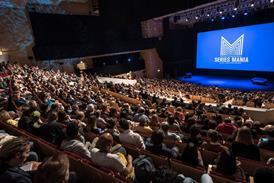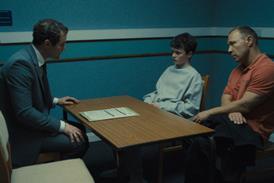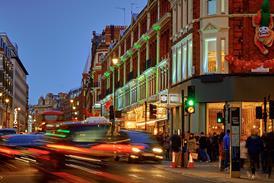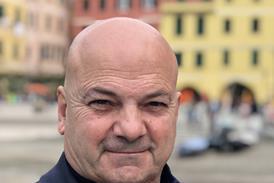Faced with an industry downturn and a major safety scare, many of the UK’s post-production facility bosses spent
2009 re-evaluating the way they run their businesses.
For the country’s post-producers, dealing with less work, lower rates and myriad new formats is one thing.
Coping with the impact of a serious fire is something else.
On 10 July, a blaze broke out in number 76 Dean Street and huge swathes of the capital’s post-production community were forced to flee a raging inferno. Home, Shed, Prime Focus, Concrete and others were all affected.
Fortunately no one was hurt but the irony of Soho going up in smoke during one of its quietest periods since the summer of 2001 was not lost on anyone who saw it.
Even before that point, things had already been looking fairly grim.
“Generally, all areas of the business had a lower demand than 18 months ago,” says Evolutions’ managing director Simon Kanjee. “Unfortunately, 2010 could be more of the same. There simply needs to be fewer edit suites in town.”
There was at least one serious (albeit temporary) casualty of the fire, though, in the shape of long-standing audio post house De Lane Lea, based next door to where the blaze started.
The facility has remained closed since that day with smoke damage making audio dubbing impossible. “I can safely say that the second half of 2009 was the worst ever experienced by De Lane Lea,” says chief executive
Huw Penallt Jones who plans to make up for lost time with a relaunch in the new year.
Overall impact
According to 15 other companies Broadcast contacted for this article, the overall impact of the fire has been negligible. But the media industry downturn has filtered through to post in three specific ways.
First, as commissioners have held back on greenlighting shows, the volume of work in certain genres has gone down. Second, pressure has been placed on virtually all budgets. And third, swathes of new and different
technology and ways of working have come to the fore.
But no one cried about it. In fact, it has prompted a number of innovations and changes which could improve things in the long run.
According to The Farm Group’s joint managing director Nicky Sargent the effort to improve efficiency started right at the top of the production chain.
“Productions have been run efficiently, in the main, as the production world has had to embrace efficiencies in order to stay competitive,” she says.
From there, it has worked its way downwards. “We were forced to take a long hard look at the way we run our
business and where we could reduce costs without compromising the quality to the client,” says Halo Post
Production managing director John Rogerson.
“The quiet time also gave us the opportunity to evaluate the effectiveness of some of our key people leading to the shake-up of the management, finance and sales structure. It gave us time to regroup, rethink and re-focus.”
Charles Frater, the owner of Silverglade Associates, in attempting to look on the bright side, says the 2009 downturn certainly provided a time to “reflect, evaluate and rebuild” but, as he freely admits, it gave him “almost
nothing else”.
Which, as his company relied heavily on work from ITV, is possibly no surprise.
Less mouths to feed
One of the many considerations during 2009 was overheads, with many post houses opting to reduce headcount.
Broadcast estimates at least 500 post-production staff were made redundant during 2009, although this figure is boosted by large cutbacks at BBC Resources, now known as BBC Studios and Post Production (S&PP), and ITV.
“We made five redundancies,” says Rogerson. “And it was deeply unpleasant for everyone involved. But it was the correct thing for the business. In the midst of a downturn you have to work with the information you have. Nobody really knows how deep it’ll be or how long it’ll continue.”
Other companies went down different routes. Framestore and Pepper closed whole departments while Prime Focus asked 80% of its staff to take a pay cut as an alternative to redundancies.
Andy Sumner, owner of the eponymous Manchester post house, says the recession and lower turnover levels forced a serious analysis of costs. “It has driven us to extract a lot more value from the wage bill and the space we occupy,” he says.
Some companies, however, soldiered on until it was too late. During 2009 a number closed, most notably
Concrete and Wildtracks. Others, like The Club and DGP, appointed administrators before being rescued.
Most of those that got into trouble fell foul of cashflow problems that were then exacerbated by a lack of available banking credit.
Positives and negatives
But while these closures had an awful impact on the livelihoods of the employees that were affected they could have had a potentially positive one on the market.
“The shrink in the market due to closures is tough on those that have gone,” says Thomas Urbye, owner of The Look. “But it has meant that there are less crazy deals being done.”
Or has it? Not according to Steve Milne, joint owner and managing director of Molinare: “This is the first year that I have witnessed a facility acting completely unprofessionally. Having lost a tender on both commercial and quality grounds [one] company halved their bid. It did its reputation a lot of damage and the client wasn’t impressed either.”
It’s a practice that few condoned but several pursued in 2009, much to the chagrin of the rest of the market. “Post companies undercutting and ‘giving it away’ was a real negative this year,” agrees Envy facility director Natascha
Cadle. “We must not, as an industry, devalue the craft.”
It’s not always the post house that is at fault, argues Kanjee. “Some producers have worked out that, more than
ever, they can play companies off against each other to drive prices down,” he says. “That has made it very tough.”
As a result, his company is now looking at new markets including commercials which it will attack with a new company called Earth that opens in the new year.
“In truth I’ll be glad to see the back of 2009,” he says. “Although, I guess it has made us look at other markets, which will end up being a positive in the long-term.”
Clive Hodge, head of operations at BBC S&PP, thinks that rather than adding to the problem, producers are actually making allowances as we head into the new year. “I believe [there was a] dawning realism by programme-makers [in 2009] that there comes a point when squeezing the post-production budget any more really will affect the fi nished result.”
This sentiment is echoed in Soho too. “This year has forced the industry to appreciate the intrinsic relationship
between client and facility,” argues Prime Focus managing director UK Simon Briggs. “Now it is more about partnerships rather than the facility being simply seen as a supplier.”
Glimmers of hope
Amid all the doom and gloom there are many other glimmers of hope.
Plotting a graph of the ups and downs of 2009 would show that January to August was slow but that business has
improved ever since.
“2009 has been our best ever year,” says Sargent. “The level of enquiries has been higher than any previous year and the subsequent level of bookings has, in turn, also been higher.”
Milne at Molinare also saw major pluses. “November will be our highest revenue month ever and we anticipate
over £4m of new business to be confirmed,” he says.
Unit Post account manager Andrew Newman thinks the downturn and the consistent pressure on client budgets
has actually increased his level of business. “Unit’s clients are still experiencing the benefits both financially
and creatively of using our affordable Final Cut Pro workfl ow,” he says.
Fire or no fire, recession or no recession, the post-production market is starting the process of re-building and it looks likely to come back stronger in 2010.
OUTSIDE LONDON
With MediaCityUK looming large on the Salford horizon and the BBC continuing to spread its commissions to all parts of the nations and regions, 2009 looked fairly good for many of those facilities outside London.
“The really positive thing about 2009 is that as MediacityUK comes ever closer we are starting to see new genres of programming being made in the North West,” says Andy Sumner. “And we’re starting to develop relationships
with programme-makers in these new areas.”
Big Bang facility manager Sarah Miller says her Bristol based company has had a “huge increase in business in 2009” while David Boyle, head of postproduction at 3sixtymedia, is staying equally positive. “It’s been better than expected and although budgets per hour were smaller the volume increased, which helped,” he says.
That’s not to say it’s all been a bed of roses. “Activity levels were defi nitely lower this year,” argues Andy Davies-Coward, creative director of 422 South in Bristol.
“And creative pitching for work reached silly levels, sometimes against as many as six competitors for projects with
tiny budgets.”
At the same time, some are not impressed with the push towards the nations and regions.
The Farm’s Nicky Sargent, who has a facility in Bristol, says: “I’d like to highlight the growth [in 2009] of the strange political force that is dragging, kicking and screaming, production and post-production work out of London;
away from the skills base; away from the infrastructure. And for what creative or economic reason?”


























No comments yet